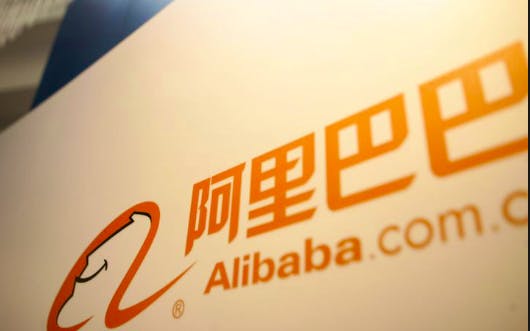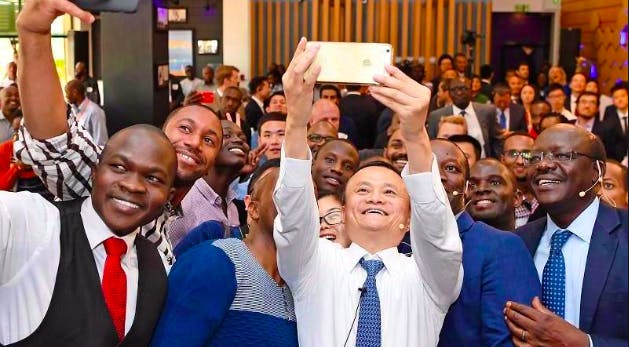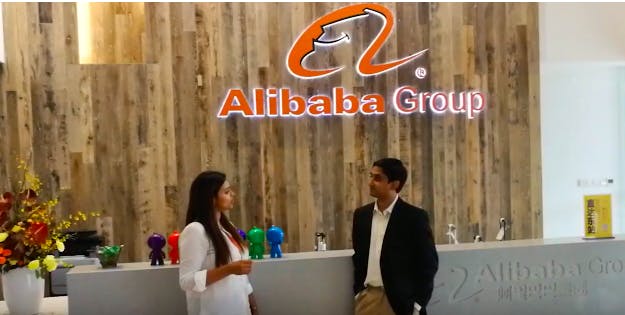You’ve had an interesting journey from CEIBS MBA into the Alibaba Leadership Academy and now a part of the global team. What do you think it takes for companies who are looking to try to globalize on the basis of E-commerce, what are ways Alibaba facilitates global ecoms?
Recently this has become China’s national strategy that will be opening up our economy to more foreign brands. We have a global department in Alibaba that’s initiating this.
We have two platforms which is our platform to incubate brands, not just incubate but also driving brands coming there to sell that they should have a legal entity to sell in China.
For brands that do not have a legal entity to sell in China, that are foreign, and wish to make an
entry to China we have another platform. And at this point, three years after opening this platform we have close to 18,000 brands from 74 countries that are planning to be working with us.

What advice do you give to companies who are based outside with no legal entity in China who are trying to enter China?
The first thing that I would ask brands is what it is that they want from their store and what is their China strategy? As much as every brand thinks it’s easy to do E-commerce in China, it’s not.
It’s past the point where things were easy, it’s very competitive. So, people want our brands to be
very committed to China. So, it works like this. We would say if the brand is very well-known it’s
China, it’s easier for them to start selling. Imagine opening an online store and no one knows you
at all in China. So, that will take for these brands to be very much committed in terms of how they
talk about things and introduce themselves.
But of course it is an opportunity that many a brand would want to try out because the
opportunities are immense. So, we facilitate brands from very well-known to probably very less
known brands. Our platform is such that we have been able to incubate new product categories
out of nothing. We call it hatching. So, we’ve had in the past year three digit growth which is amazing.
The thing is that the average Chinese consumer’s spending power is on the rise, they’re used to
platform shopping for close to 10 to 15 years and they are now looking for many premium
experiences and they consistently want to open as their one-stop shop for completely trustworthy
customer experience when they try out new brands.

Given that there’s a range of brands from well-known to not well-known but also a range of
countries from which companies are coming, are there any differences you’ve noticed in terms of
what it takes for a company from Europe to be successful using this platform versus a company
from say another emerging market?
It all boils down to how much that product category is growing on the platform, what is the
brand awareness of this particular brand. And if you are looking for something more country
specific, there are certain emotions that are attached to certain countries, let’s say Japan and
Korea for beauty related products, Germany for more quality products of home appliances let’s
say. New Zealand and Australian products for their sourcing strength, like you can trace their
source so they know that it’s original and it’s gone through a process, so milk maybe you want to
purchase from New Zealand whereas beauty products from Japan, home appliances from
Germany. These are very high level emotions.
But if you ask me something from emerging markets, I’d say if the brand has a good story and if it’s
a product that consumers are interested in, why not?

What about Africa? What advice would you give from entrepreneurs from Africa?
Again, I would say it would ask is this what the Chinese consumers want? Sometimes we’ve had products from Spain, beauty products from Spain, very lesser known brands, almost immediately incubated. We have very strong story from last year, 2017, which is a brand that launched on the platform and they’ve made 100
million RMB in 2017 only because they saw a need for a particular beauty product that was
selling well in China already, they managed to market it in such a way that it had smaller quantities
that consumers could try and they also were good with their price points.
If you can find a niche, a demand and a supply that you can justify, you still have a chance.
You’re trying to promote entrepreneurship in Africa, right?
Yes. So, I would say the older idea is with the E-founders initiative, what they’re trying to do is
they would like to empower the growing entrepreneurs there and it’s more about sharing the
knowledge so that we can capacitate the entrepreneurs in these emerging markets with skills that
will help them build their own Alibabas.
As you reflect back on your journey, now being part of one of the large iconic Chinese
companies, what have been some of your key learnings about what it takes to become part of an
organization like this?
I’d say the basics remain the same—hard work. From an
Asian context, it will also be very useful to be mindful of your fellow worker’s needs, wants,
feelings. There is a collective work culture and you better be part of it if you want to stay here for
long. It’s slightly different from the Western work cultures where it’s more individualistic. I haven’t seen anything like this anywhere, the vigour with which an Ali employee would work for this company is something that you don’t usually get to see elsewhere.
As a woman, what advice would you give to other budding women leaders out there?
At least in Alibaba, one thing I’ve seen is women are very, very empowered, they take
decisions, they call the shots. In fact, if you come into the business teams, you’ll see more women
than men on our floor. And these are very strong women with good capabilities.
I think Jack has mentioned before, he really values the inputs given by women because he feels
that they bring a different value. I don’t think I do anything different from any of men
counterparts, it’s just that I always feel hard work and becoming tenacious about what you do is
the way to succeed wherever you are.
Register now for free advice about the CEIBS MBA or studying an MBA in China by filling out the form below
- Curriculum of the Film Production Program at Beijing Film Academy - November 3, 2023
- 11 Things Every Ethiopian Student Should Know About Studying in China - June 28, 2022
- CEIBS MBA Interview 31 Sample Questions & Tips - February 23, 2022
